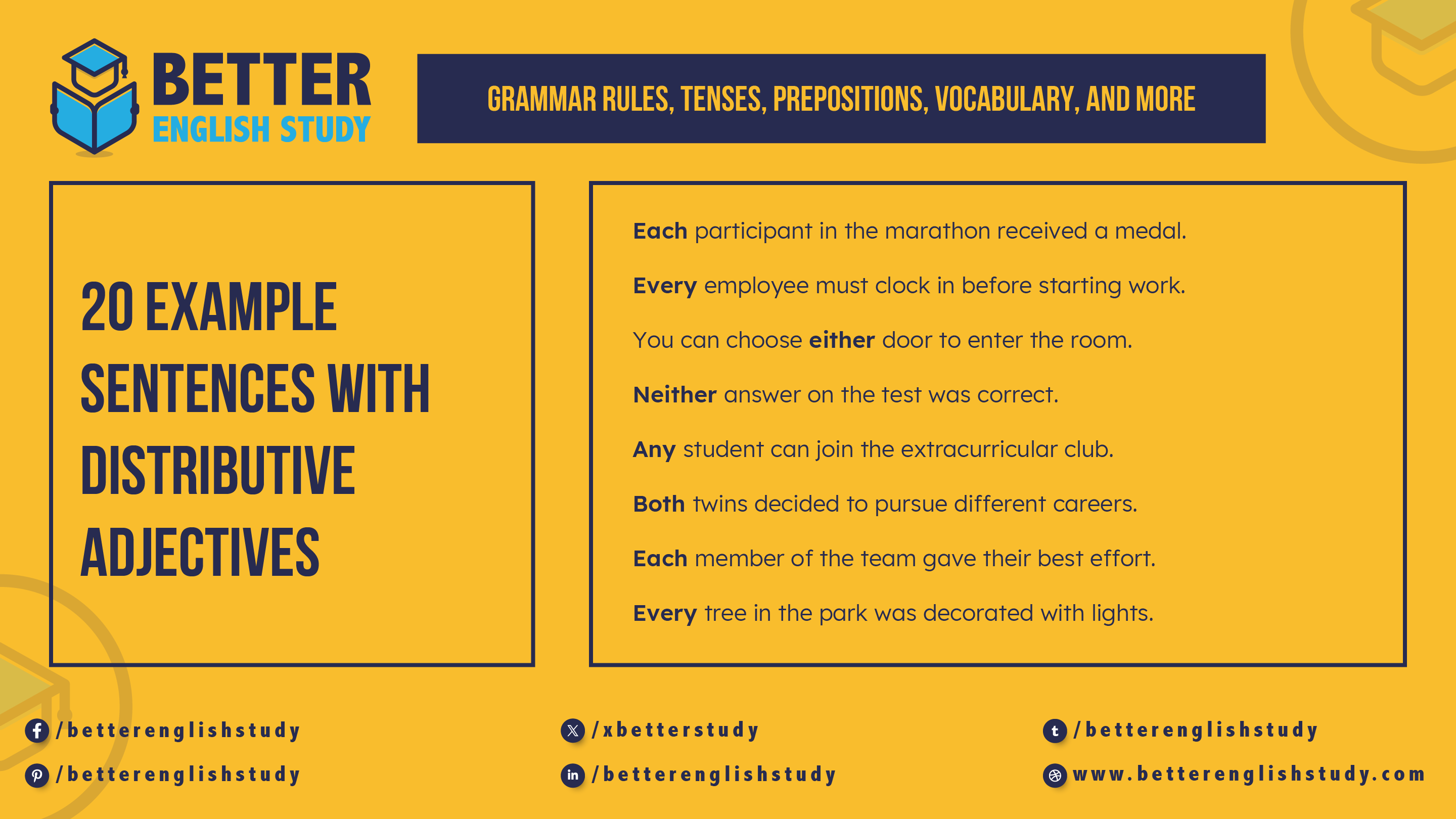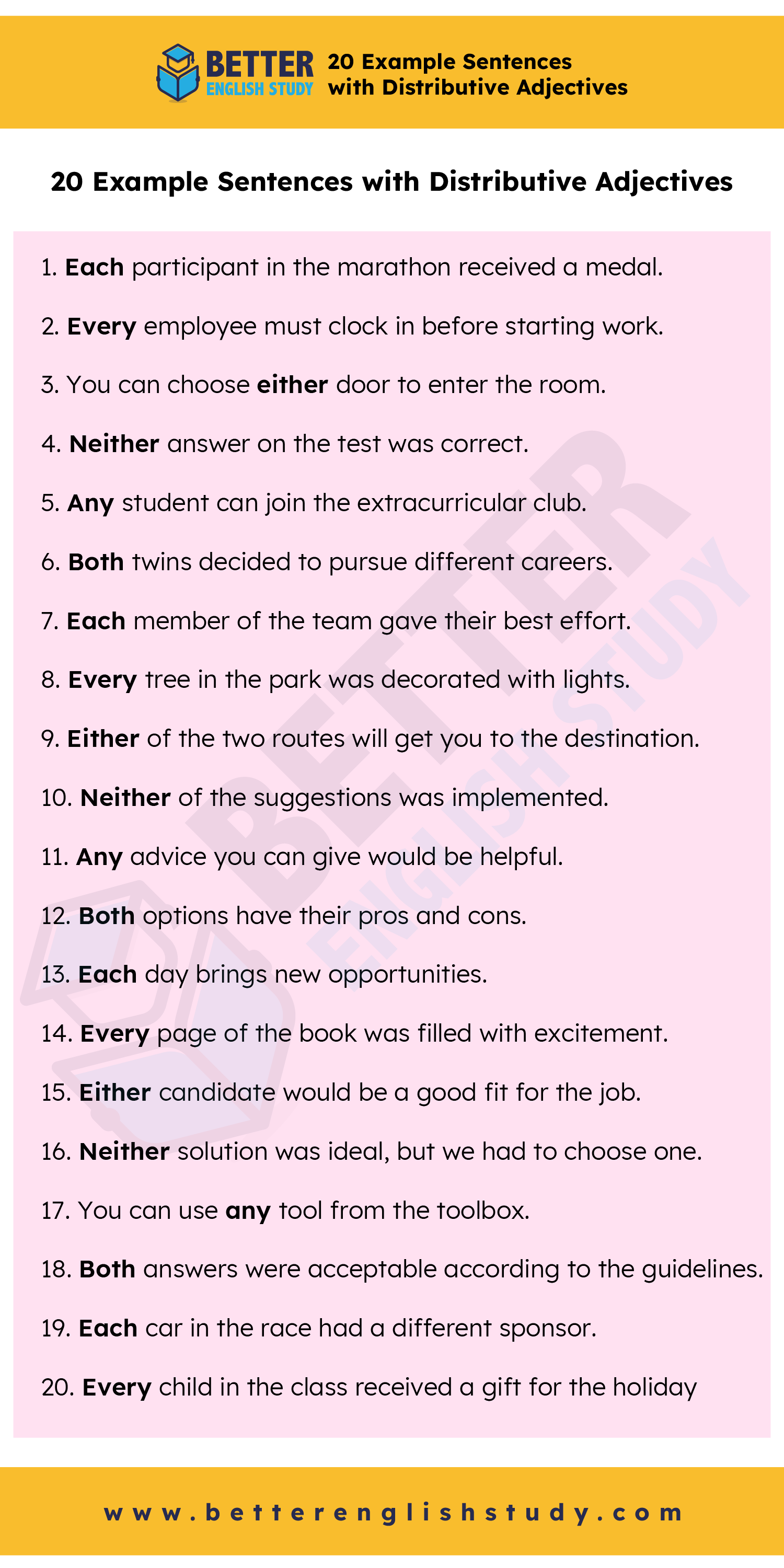
Distributive adjectives are a fascinating part of English grammar, used to refer to individual members within a group, either individually or collectively. Understanding these adjectives can greatly enhance your precision and clarity in communication.
What Are Distributive Adjectives?
Distributive adjectives are words that refer to individual members within a group. They ensure that we understand something about each, every, either, neither, any, or both members of the group. They help us specify and clarify which members of a group we are talking about.
Examples of Distributive Adjectives
1. Each
- Example: Each student has a unique ID.
- Explanation: “Each” refers to every single student individually.
2. Every
- Example: Every book in the library is cataloged.
- Explanation: “Every” refers to all the books, considered individually within the group.
3. Either
- Example: You can choose either cake.
- Explanation: “Either” indicates a choice between two options.
4. Neither
- Example: Neither option seems appealing.
- Explanation: “Neither” indicates that not one of the two options is appealing.
5. Any
- Example: Any student can join the club.
- Explanation: “Any” indicates that it does not matter which student joins; the statement applies to all.
6. Both
- Example: Both answers are correct.
- Explanation: “Both” refers to two items collectively, indicating that each one is correct.
How to Use Distributive Adjectives in Sentences
Using distributive adjectives correctly involves placing them before the noun they modify to indicate something about each member of the group. Here are detailed explanations and examples:
1. Each
Each member of the team contributed to the project.
- Explanation: “Each” specifies that every single member individually contributed.
2. Every
Every house on the street was decorated for the festival.
- Explanation: “Every” emphasizes that all houses, considered individually, were decorated.
3. Either
Either solution will work for this problem.
- Explanation: “Either” suggests that there are two possible solutions, and both are acceptable.
4. Neither
Neither candidate was suitable for the job.
- Explanation: “Neither” indicates that not one of the two candidates was suitable.
5. Any
Any employee can apply for the new position.
- Explanation: “Any” suggests that it doesn’t matter which employee applies; the opportunity is open to all.
6. Both
Both twins have a talent for music.
- Explanation: “Both” refers to the two twins collectively, indicating that each one has a talent for music.

Detailed Explanation of Distributive Adjectives
1. Each
- Usage: Used to refer to individual members of a group.
- Example: “Each child received a gift.”
- Detail: “Each” emphasizes individuality within the group.
2. Every
- Usage: Similar to “each,” but used more generally to refer to all members individually.
- Example: “Every employee must attend the meeting.”
- Detail: “Every” implies that all individuals in the group are considered separately but collectively.
3. Either
- Usage: Used to refer to one or the other of two choices.
- Example: “You can park on either side of the street.”
- Detail: “Either” indicates a choice between two distinct options.
4. Neither
- Usage: Used to refer to not one and not the other of two choices.
- Example: “Neither answer is correct.”
- Detail: “Neither” implies that both options are invalid or unsuitable.
5. Any
- Usage: Used to refer to one, some, or all members of a group without specification.
- Example: “Any child can participate in the game.”
- Detail: “Any” suggests that the statement applies to all members of the group.
6. Both
- Usage: Used to refer to two things together.
- Example: “Both candidates are qualified for the job.”
- Detail: “Both” indicates that two items are being considered collectively.
Summary Table for Distributive Adjectives
| Distributive Adjective | Usage | Example Sentence |
| Each | Refers to individual members | “Each student in the class received a certificate.” |
| Every | Refers to all members individually | “Every car in the parking lot was covered in snow.” |
| Either | Refers to one or the other of two choices | “You can take either book from the shelf to read.” |
| Neither | Refers to not one and not the other of two choices | “Neither option seemed appealing to the committee.” |
| Any | Refers to one, some, or all members without specification | “Is there any way to solve this problem quickly?” |
| Both | Refers to two things together | “Both solutions were viable.” |
Common Mistakes and Tips
1. Confusing Each and Every:
- Tip: Use “each” for individual emphasis and “every” for a general statement about all.
- Incorrect: “Every of the students has a book.”
- Correct: “Each of the students has a book.”
2. Using Either and Neither Incorrectly:
- Tip: Remember “either” is for positive choices, and “neither” is for negative.
- Incorrect: “Neither side of the argument is valid.”
- Correct: “Neither side of the argument is valid.”
3. Misplacing Any:
- Tip: Use “any” for indefinite, non-specific statements.
- Incorrect: “Every student can solve any problem.”
- Correct: “Any student can solve the problem.”
20 Example Sentences with Distributive Adjectives
- Each participant in the marathon received a medal.
- Every employee must clock in before starting work.
- You can choose either door to enter the room.
- Neither answer on the test was correct.
- Any student can join the extracurricular club.
- Both twins decided to pursue different careers.
- Each member of the team gave their best effort.
- Every tree in the park was decorated with lights.
- Either of the two routes will get you to the destination.
- Neither of the suggestions was implemented.
- Any advice you can give would be helpful.
- Both options have their pros and cons.
- Each day brings new opportunities.
- Every page of the book was filled with excitement.
- Either candidate would be a good fit for the job.
- Neither solution was ideal, but we had to choose one.
- You can use any tool from the toolbox.
- Both answers were acceptable according to the guidelines.
- Each car in the race had a different sponsor.
- Every child in the class received a gift for the holiday.
FAQs about Distributive Adjectives
What is the difference between “each” and “every”?
“Each” refers to individual items separately within a group. In contrast, “every” refers to all items in a group as individual entities, not collectively.
Can “either” be used with more than two options?
No, “either” is specifically used to refer to one or the other of two options. For more than two, use “any.”
How do “neither” and “either” differ?
“Neither” indicates neither one nor the other of two options, while “either” indicates a choice between two options.
Can “any” be used in negative sentences?
Yes, “any” is often used in negative sentences to indicate no member of the group. For example, “I don’t have any money.”
Is “both” used only for two items?
Yes, “both” specifically refers to two items considered together.
Distributive adjectives are essential for making your speech and writing more precise. By mastering their use, you can convey exactly what you mean and make your communication clearer and more effective.
